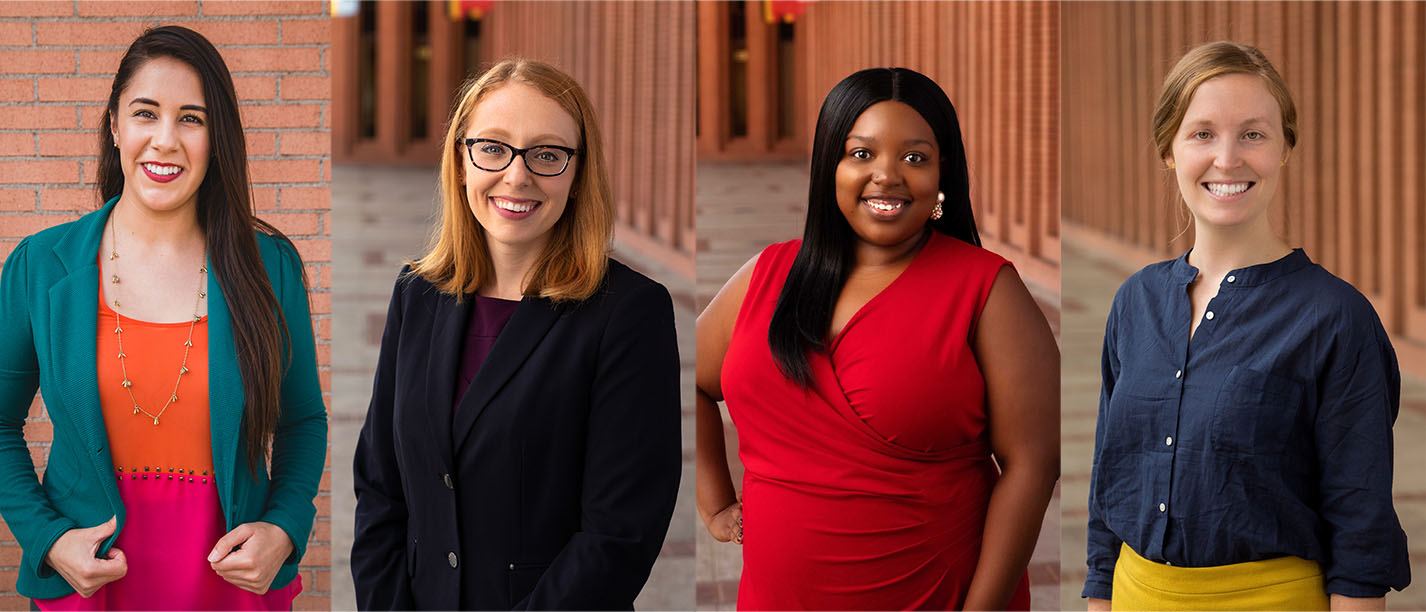
Four Pullias Center research assistants awarded research grants
Congratulations to Pullias research assistants Arely Acuña Avilez, Lauren Irwin, Aireale Joi Rodgers and Deborah E. Southern, recipients of Rossier Research Office Internal Research Grants!
Below are the titles and abstracts of the research papers the grants will support.
Arely Acuña Avilez: Undocumented Student Organizations: Navigating the Sociopolitical Context in Higher Education
Though largely understudied, research shows that peer groups and student organizations are critical sources of information and support for undocumented students in colleges and universities. This study expands on the knowledge of undocumented student organizations, and explores how they navigate a heightened anti-immigrant sociopolitical climate in higher education. Through comparative qualitative case study methodology, I explore the ways that a heightened anti-immigrant sociopolitical context shapes undocumented students’ experiences in higher education. In particular, I examine how undocumented student organizations at four-year public and private institutions with different campus climates towards undocumented students navigate threats and opportunities created by their immediate environment nested within the larger sociopolitical context. This research is necessary to understand the impact of the current sociopolitical climate on students, how students can collectively overcome barriers in order to continue to persist and achieve their academic goals, and how institutions can play a better role in supporting and collaborating with student organizations.
Lauren Irwin: The Influence of Service Learning Participation on White Women’s Learning and Identity Exploration
Research on undergraduate service learning identified white women as the largest demographic of service learning participants (Mitchell et al., 2012; Endres & Gould, 2009; Green, 2003); however, few studies have explored how participation in service learning influences white women’s critical explorations of whiteness and learning about social justice. Scholars argued that when white women engage in service learning programs without explorations of power, race, and social inequality, it perpetuates social injustice by instilling the belief that they are the most capable servants (Green, 2003; Mitchell et al., 2012). These beliefs uphold white supremacy. This study will utilize narrative inquiry to address the following research question: How does participation in service learning influence white women’s critical explorations of whiteness and learning about social justice?Findings will provide insight into the ways that service learning influences white women’s critical examinations of whiteness to inform future studies and recommendations for service learning programs.
Aireale Joi Rodgers: Deconstructing the Diversity Dupe: Testimonios of First Generation Future Doctoras
Despite increased enrollment by students of Color and growing commitments to diversity at institutions of higher education, changes in structural diversity have often not resulted in changes to campus culture that promote equity and dismantle white supremacy. In fact, colleges and universities that embrace structural diversity while neglecting institutional change ironically contribute to what Delgado Bernal and Villalpando (2002) call an “apartheid of knowledge” where students are left to navigate institutions that embrace their physical presence yet resist the cultural resources and epistemic diversity they contribute. In this study, a critical method of narrative inquiry, testimonio, is used to make meaning of the self-reported racialized, gendered, and politicized experiences of three first-generation women of Color doctoral students. Mainly, the study explores processes of professionalization and socialization in curricular learning environments in education Ph.D. programs. Rodgers will conduct this research in partnership with Judith Landeros (University of Texas, Austin) and Margarita Vizcarra (University of California, Riverside).
Deborah E. Southern: Interrogating Whiteness in Higher Education: Comprehensive First-Year Courses and Implications for Equity
Analyzing whiteness and how it functions as power in higher education is vital to a full conceptualization of racial inequity and oppression in postsecondary education. Whiteness as power in higher education and sociology literature is largely theoretical, and thus there is a need for empirical evidence of whiteness so that it may be disrupted in practice. In this empirical study, I investigate first-year comprehensive courses in higher education through a critical lens oriented towards racial equity and the interrogation of whiteness. If whiteness permeates these comprehensive first-year classrooms, then they will be an ideal site to design interventions to disrupt whiteness and dismantle colluding practices that foster oppressive campus environments.
Avilez, Irwin, Rodgers and Southern are among the Pullias Center’s 15 research assistants, who conduct higher education research along with five full-time post-doctoral scholars and eight faculty members.